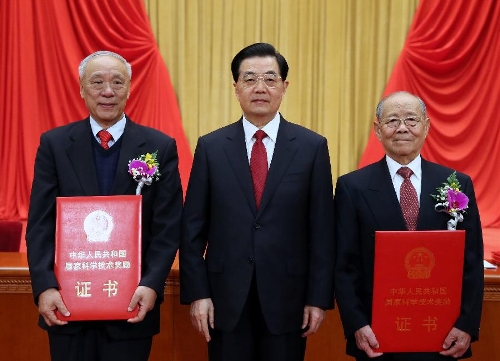Scientists awarded top prize, Xi urges innovation-driven growth

Explosion mechanics expert Zheng Zhemin and radar engineer Wang Xiaomo won China's top science award on Friday at a high-profile annual ceremony held to honor distinguished scientists and research achievements.
They were honored for their remarkable contributions to scientific and technological innovation, according to a government statement.
They were each awarded 5 million yuan (803,792 US dollars).
Their awards were presented by President Hu Jintao at the ceremony. Chinese leaders Xi Jinping, Wen Jiabao, Li Keqiang and Liu Yunshan were also present.
The government has given the annual award to distinguished scientists for 13 consecutive years, and 22 top scientists, including Zheng and Wang, have won the award so far. The award is aimed at boosting innovation-powered development.
China aims to build itself into an innovative country by 2020, when scientific progress will contribute to nearly 60 percent of the nation's economic growth, according to a national science and technology development plan.
Zheng, 88, is a member of both the Chinese Academy of Sciences and the Chinese Academy of Engineering (CAE).
He has devoted his career to research in the areas of elastic mechanics, explosive processing and underground nuclear detonations.
Zheng is a pioneer and founder of the scientific discipline of explosion mechanics in China. The achievements of his studies were used in the manufacturing of components of the country's first rockets, contributing much to the development of rocket and satellite technologies.
In the early years of his studies, Zheng was a student of China's late "father of mechanics," Qian Weichang, and later, a student of the "father of space technology," Qian Xuesen.
Wang, 74, is a CAE member who has engaged in radar-related research and design for the past 30 years. He is regarded as the "father" of airborne warning and control system (AWACS) in China.
His success in leading China's independent AWACS research has contributed to advances in the construction of the country's air defense network.
Wang continued his work even after being diagnosed with lymphoma.
The AWACS project won the State Special Award for Scientific and Technological Progress in 2010, and China-made AWACS aircraft are also exported abroad.
"As a scientist, I'm honored to have grown up in, and contributed to, this era," Wang said in his speech delivered on behalf of all awarded scientists.
"Facts show that only through innovation can science and technology make progress, the economy develop, people's living standards improve and the country prosper," Wang said.
Xi, general secretary of the Central Committee of the Communist Party of China (CPC), said at the ceremony that China needs to realize a growth pattern driven by innovation.
He encouraged Chinese scientists and researchers to follow the example set by the two scientists and contribute their wisdom to the country and the people.
Premier Wen Jiabao called for a closer integration of research entities and enterprises, and he promised support for enterprises looking to establish research and development centers.
Wen said the country needs breakthroughs in the development and marketing of high-tech products.
The government will devote more resources toward science and technology that are considered to be vital for China's long-term development, he said.
The government will also create an environment that promotes fair play and encourages creativity and initiative among scientists and researchers, he added.
Awards were also given to a number of other scientists, as well as scientific research programs, at the ceremony.
Chemist Richard N. Zare from the United States, as well as another four foreign experts from the US, Canada, Denmark and Japan, respectively, received the International Cooperation Award in Science and Technology.
The Chang'e-2, a Chinese lunar orbiter, and another two projects were honored with the State Special Award for Scientific and Technological Progress.
Another 41 projects received second-level prizes in the State Natural Sciences Award competition. No first-level prizes were awarded, marking the ninth time in the last 13 years that the first-level prize was not awarded.
Three projects earned first-level prizes in the State Technology Invention Award competition, while 74 others received second-level prizes.
Young and middle-aged scientists, as well as those returning from overseas, are becoming the mainstay of Chinese innovation in science and technology.
The participants in the awarded projects averaged 47 years old, with 44.2 percent of them aged 45 or under, and 56.1 percent of the projects' chief scientists are scholars who have returned from overseas, official figures show.